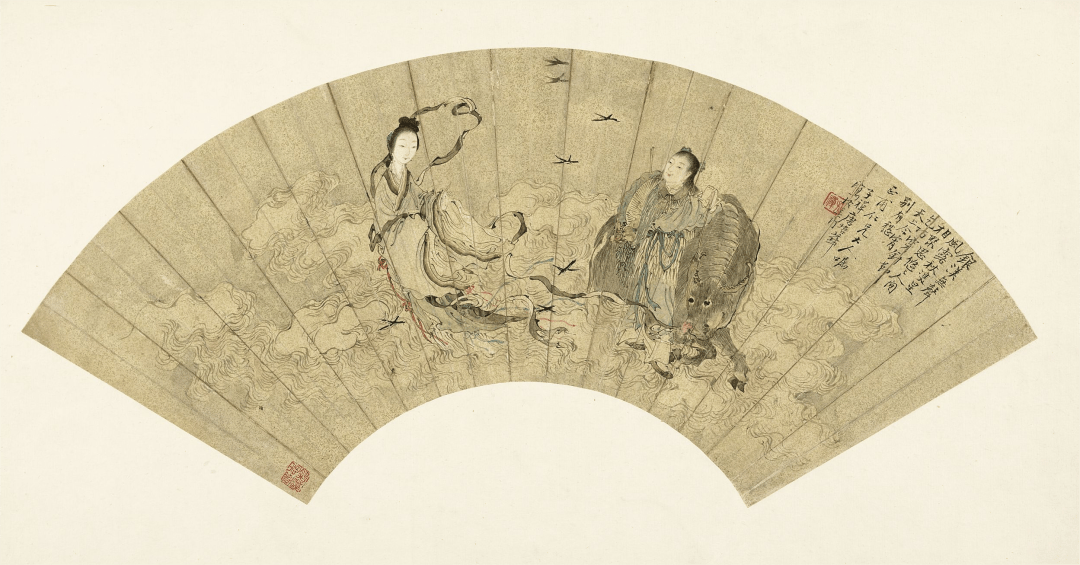The Qixi Festival, also known as the Double Seventh Festival, is a cherished traditional celebration in Chinese folklore. It carries various names, including the Night of Sevens, Daughter’s Festival, Begging for Skills Festival, and Cowherd and Weaver Girl Day, among others. The festival is observed on the seventh day of the seventh lunar month. The earliest recorded mention of the "Seventh Day of the Seventh Month" appears in the Eastern Han scholar Cui Shi’s "Monthly Ordinances for the Four Classes of People."

Tang Peihua's Cowherd and Weaver Girl Painting from the Qing Dynasty, collected by the National Palace Museum in Taipei
Originally rooted in the ancient worship of stars, the Qixi Festival evolved to embody the romantic legend of the Cowherd and Weaver Girl, a tale that captured the hearts of countless generations. The festival became a special night for young girls to honor the stars, seeking blessings for dexterity and skillfulness. By the Six Dynasties period, the customs of Qixi had become rich and fully developed. After the Han and Wei dynasties, Qixi mainly served as a day for women to express their wishes, compare their handiwork, and display their craftsmanship. Traditional activities during Qixi include eating special treats like Qiao Guo (skilled pastries) and Qiao Ya noodles, and engaging in various rituals such as threading needles, observing spider webs for signs of good fortune, staying up all night to make wishes, airing books, and drying clothes. In its early days, the Qixi Festival was a courtyard-based celebration, but during the Tang and Song dynasties, it evolved into a public festival, only to return to a more private, familial observance during the Ming and Qing dynasties. Today, Qixi has once again expanded from a family-oriented event to a social festival, allowing communities to connect, enliven local life, and strengthen social bonds through its ceremonial reenactments.
The essence of Qixi is a blend of folk culture, the pursuit of love, the spirit of innovation, and national pride. This festival has provided us with a rich cultural legacy, encompassing values like love, diligence, ambition, morality, and a sense of responsibility. It stands as a prime example of how traditional Chinese festivals are experiencing a revival in an increasingly globalized world. On May 20, 2006, Qixi was recognized as a part of the first group of national intangible cultural heritage in China. By 2008, the Qiqiao customs of Xihe in Gansu were included in the second group, followed by the Qixi traditions of Tianhe in Guangdong and Wenling in Zhejiang in 2011, and the Qixi customs of Yunxi in Hubei in 2014. The influence of Qixi extends beyond China’s borders, impacting neighboring Asian countries such as Japan, Vietnam, and the Korean Peninsula.
The customs of Qixi embody the pursuit of steadfast love and promote ideals of marital harmony and family unity, contributing to social stability and development. The myths and legends associated with Qixi, particularly the story of the Cowherd and Weaver Girl, reflect a love that defies worldly constraints and transcends societal norms—a pure and sincere affection that remains unshackled by class and convention.
In regions like Guangdong and Hong Kong, the core tradition of "begging for skills" during Qixi is still alive. The essence of this custom lies in creativity and innovation. The Chinese people, known for their diligence and unyielding spirit, manifest the beauty of advancing productivity and social progress through their festival culture. Qixi is inherently a festival of love and marriage. The timeless verses "May we be two birds flying wing to wing in the sky; may we be two trees with branches intertwined on earth" and "If love between both sides can last for ages, why need they stay together night and day?" epitomize the purest and most heartfelt views on love in Chinese culture. The tale of the Cowherd and Weaver Girl upholds the values of loyalty and perseverance. The traditional ideals of mutual respect in marriage, family harmony, a fulfilled life, and the pursuit of happiness have, over millennia, become the cornerstone of the Chinese perspective on love and family.
In 2006, the Qixi Festival was officially included in the first batch of national intangible cultural heritage by the State Council. Later, the legend of the Cowherd and Weaver Girl was also recognized as part of the second batch of national intangible cultural heritage.










